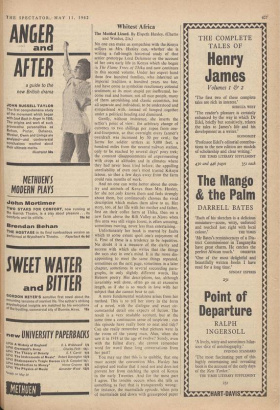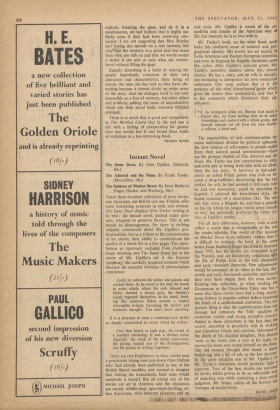Whitest Africa
The Mottled Lizard. By Elspeth Huxley. (Chatto and Windus, 21s.) No one can make us sympathise with the )14.enya settlers as Mrs. Huxley can, whether she is writing a full-length historical study of that settler prototype Lord Delamere or the account of her own early life in Kenya which she began in The Flame Trees of Thika and now continues in this second volume. Under her expert hand these few hundred families, who inherited an imperial tradition. a hundred years too late, and have come to symbolise reactionary colonial sentiment at its most stupid yet ineffectual, be- come real and human; not all nice people, many of them astonishing and classic eccentrics, but all separate and individual, to be understood and sympathised with, instead of lumped together under a political heading and dismissed.
Gently, without insistence, she inserts the settler's point of view: the arbitrary change of currency to two shillings per rupee from one- and-fourpence, so that overnight every farmer's overdraft was increased by 50 per cent.; the farms for soldier settlers at 9,000 feet, a hundred miles from the nearest railway station, only to be reached by several days' pony trek; the constant disappointments of experimenting with crops at altitudes and in climates where they had never been tried before; the appalling unreliability of even one's most trusted Kikuyu labour, so that a few days away from the farm could ruin months of work.
And no one can write better about the coun- try and animals of Kenya than Mrs. Huxley, for she not only knows them and feels strongly about them, but continuously chooses the vivid description which makes them alive to us. Her story, WO, of her life with her mother and father, first on their coffee farm at Thika, then on a new farm above the Rift Valley at Njoro when this area was still virgin forest, is often amusing, sometimes moving, never less than entertaining.
Unfortunately her book is marred by faults which to some extent spoil one's enjoyment of it. First of these is a tendency to be repetitive. No doubt it is a measure of the clarity and success with which she writes that the things she says stay in one's mind. It is the more dis- appointing to meet the same things repeated, sometimes on the next page, sometimes in a later chapter, sometimes in several succeeding para- graphs, in only slightly different words, like Hebrew poetry. Her descriptions, too, although invariably well done, often go on at excessive length, as if she is so much in love with her subject that she cannot bear to cut.
A more fundamental weakness arises from her method. This is to tell her story in the form of a novel, with the dialogue and exact cir- cumstantial detail one expects of fiction. The result is a very readable account, but at the same time a continuous sense of suspicion: can this episode have really been so neat and tidy? Can she really remember what pictures were in the room of the young man, Alan, when she saw it in 1918 at the age of twelve? Surely, even with the fullest diary, she cannot remember word for word these long conversations from her past?
You may say that this is to quibble, that one must accept the convention Mrs. Huxley has adopted and realise that it need not and does not prevent her from catching the spirit of Kenya in the early Twenties. And for the most part I agree. The trouble occurs when she tells us something as fact that is transparently wrong: for instance, the marmalade episode, when pots of marmalade tied down with greaseproof paper explode, breaking the glass, and do if in a Simultaneous, air-raid fashion that is highly un- likely even if they had been screw-top con- tainers. I am not suggesting that Mrs. Huxley isn't basing this episode on a real memory, but only that her memory is a good deal less exact than what she tells us and that we would accept it better if she told us only what she remem- bered without filling the gaps.
Equally disturbing is a habit of making her people improbably conscious of their own characters and characteristics, these being, of course, the ones she has told us they have, dis- turbing because it throws doubt on wider areas of the story. And the dialogue itself is not only impossible as a feat of memory, but often stilted and artificial, adding the sense of improbability which one feels about badly executed fictional dialogue.
There is so much that is good and sympathetic in The Mottled Lizard that in the end one is left with a feeling of exasperation far greater than one would feel if one found these faults of technique in a less interesting book.
THOMAS H1NDE



































 Previous page
Previous page